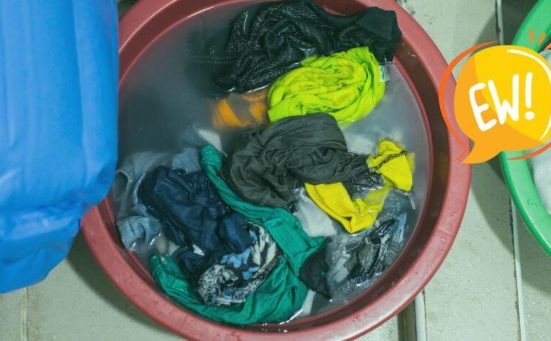
What Is A Synthetic Wash Programme? (when & how to use it)
As more and more clothes are made using synthetic fabrics nowadays, washing machine manufacturers have developed synthetic wash programmes to ensure that those clothes get washed correctly. Around 62% of all clothes currently manufactured are made using synthetic materials.
So it’s understandable why washing machines now come with a synthetic wash cycle.
What Are Synthetic Materials?
Synthetic materials include materials like;
- Polyester
- Nylon
- Rayon
- Acrylic
- Elastane
- Spandex
- Lycra
Many of these synthetic materials are made from derivatives of the petrochemical industry. While others are made from natural products chemically treated to produce fabrics. Either way, synthetic man made materials are all thin, lightweight and repel moisture and stains and don’t need much of a spin to get dry.
This is because they do not absorb moisture like natural fabrics like cotton and wool.
What Is A Synthetic Wash Programme?
A synthetic wash programme is a wash specifically designed for washing synthetic materials. As more than 60% of all clothes produced are now made from synthetic materials there’s a high chance you will own some items of synthetic clothing.
Synthetic clothes are typically easy to clean, fast drying and moisture repellent. These same qualities are reflected in the synthetic wash programme on your washing machine.
The synthetic cycle is a gentle wash cycle using low temperatures, a low spin speed and minimum agitation. The average spin speed for a synthetic wash cycle is around 600 to 800 RPM with the water temperature never going above warm.
Synthetic cycles tend to be no longer than 40 minutes at most with the least agitation of any wash cycle. The synthetic cycle is an eco friendly cycle in the fact that it uses less energy to heat the water, and less water than regular wash cycles.
How To Wash Synthetic Fabrics Using The Synthetic Wash Cycle On A Washing Machine
Before using the synthetic cycle on your washing machine, you need to separate your laundry into natural fibres and synthetics. You then need to bear in mind that synthetic fabrics have their own specific wash care instructions when it comes to stain removal.
This means that once you have a pile of synthetic clothes, you’ll need to go through them again and make piles for each specific type of synthetic material.
For instance, blended items should be washed using the blended cycle which is specifically for blended items. Rayon should be hand washed or dry cleaned only as it is too delicate for machine washing.
For the others including; polyester, nylon, acrylic and elastane – these can all be washed using the synthetics cycle.
How To Preserve Synthetic Clothes For Longer
To protect your synthetic clothes from damage and premature ageing, you should always;
- Refrain from overwashing
As synthetic materials tend to repel stains and don’t absorb moisture, they need less washing than cotton or other natural fibre clothes. The more you wash clothes, the more likely they are to wear out. - Don’t use fabric softener
There is no need to use fabric softeners on synthetic clothes as they don’t lose their softness. The use of fabric softeners can actually damage synthetic materials. - Use cool wash temperatures
This is often already part of the synthetic cycle but choose the lowest available temperature if you are given the option. - Use a low spin speed
Some machines allow you to adjust the spin speed on the synthetic cycle. If you can, choose the lowest spin speed to prevent damage and the ripping of microfibres which leads to the clothes wearing out faster. - Air dry
Synthetic clothes don’t absorb as much water as natural fibres which makes them ideal for air drying. Air drying synthetic clothes also prevents any chance of damage, burning or shrinkage in the tumble dryer. - Wash full loads
If the drum is completely full of clothes there is less space for the clothes to rub against each other. Which reduces friction which can damage your clothes. - Use mesh laundry bags
Placing your synthetic clothes in mesh laundry bags helps to prevent any damage through friction of the clothes rubbing together. - Use the correct detergent
You should use a synthetic approved detergent or a mild detergent when washing synthetic clothes. You should also refrain from using powdered detergent as it can damage synthetic fabrics.
The Problem With Microplastics
As synthetic fabrics are made from plastic polymers, they shed microplastics every time they are washed. These minute plastic particles get knocked off synthetic materials in the washing machine even at low spin speeds and low temperatures.
Microplastics then get into the water supply, drain into rivers and oceans and pollute the water and the wildlife as well. Microplastics have been found in fish and other aquatic wildlife. The more you can reduce washing synthetic clothes, the less you are adding to the microplastic problems in the world.
What do you call a man who has a PhD in washing machines?
A Spin Doctor! 😂
SEE ALSO: Cotton Vs Synthetic Wash Cycle – What’s The Difference?
Frequently Asked Questions
A synthetic wash is a delicate wash but it is not a wash specifically designed for delicate clothes. Delicates have a specific cycle as do synthetics.
The best wash cycle for synthetics is the synthetics cycle. If your machine doesn’t have a synthetics cycle, you can use the delicate cycle.
A 30 degree C synthetic wash takes around 15 to 30 minutes on average.
You should always wash synthetics separately to cotton or other fabrics. It is always advisable to use a specific synthetic detergent which is designed specifically for synthetic fabrics.
Also, follow us on Pinterest ...



